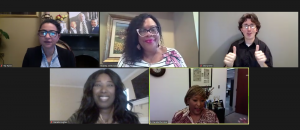For students, attending a historically Black college or university “gives you an opportunity to embrace and enhance your Blackness, a place to celebrate who you are as an African American,” said Dr. Tia C. M. Tyree, a professor and interim associate dean of the Cathy Hughes School of Communications at Howard University in Washington, D.C.
Tyree was one of four panelists on PRSA’s Feb. 23 Diverse Dialogues webinar, “What You Need to Know About HBCUs: A Reservoir of Public Relations Talent and Desire.”

The Higher Education Act of 1965 defines an HBCU as “any historically black college or university that was established prior to 1964, whose principal mission was, and is, the education of black Americans.” According to the U.S. Department of Education, these 107 accredited schools “offer all students, regardless of race, an opportunity to develop their skills and talents” so they can pursue professional careers.
“We’re preparing the next generation of successors in our public relations practice,” said Shanita Baraka Akintonde, the webinar’s moderator and a professor in The School of Media Arts at Columbia College Chicago.
No longer just places for people who could not find classrooms in the mainstream, HBCUs “have blossomed to become comparable to any majority institution,” said panelist B. DàVida Plummer, assistant vice president for marketing and media at Hampton University in Hampton, Va.
“The HBCU experience is about love,” said panelist Ranata Hughes, a visiting professor and internship coordinator at Florida A&M University’s School of Journalism & Graphic Communication. Not just people of color, “but everyone is welcome and can become successful here and beyond,” she said. “We love all, no matter what.”
At Florida A&M, “We train our students to be multitalented, so they can land a job at any agency, any company,” Hughes said. “We train our students to not just be PR practitioners, but to be journalists.” Her students take news-writing and reporting classes and learn basic graphic design, she said.
At Howard University, “We run the full spectrum of PR classes” to “create a graduate who understands not just the theoretical aspects but the practical ways to come into an entry-level job, ready to work,” Tyree said.
“Take advantage of every opportunity.”
Students interested in PR careers should “dive in, delve [in], get involved,” Plummer said. “Take advantage of every single opportunity. You’ve got four years to maximize this experience. Create your own brand. Solidify who you are and what you would mean to a company. Find a practical application that suits your passion. Explore it, experience it and land that gig.”
Tyree advises students to “have the skills, because that’s what employers are looking for. I don’t care who you are, where you come from, what you look like — if you show up with the skills, you’re going to be hired.” She also recommends that students get to know their PRSSA advisers and find mentors who will lead them to career opportunities.
Hughes said she had a great time working in public relations before becoming an educator. She urges students of color to enter the PR profession with an open mind. “Don’t assume that you’re gonna be hated by all,” she said. “It might be the best experience of your life.”
Greg Beaubien is a frequent contributor to PRSA publications.
[Photo credit: an nguyen]

